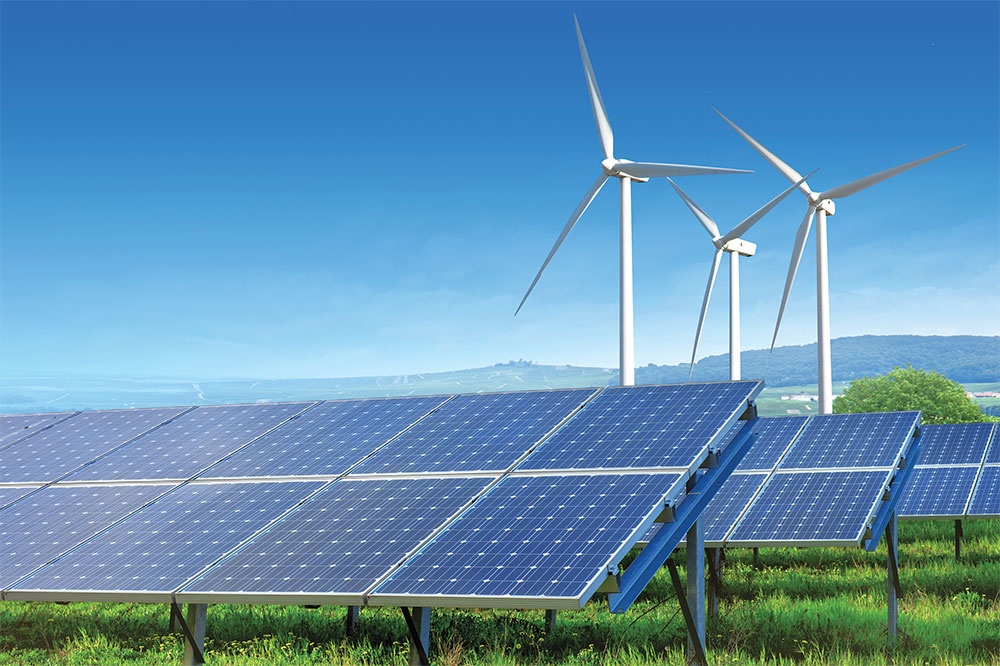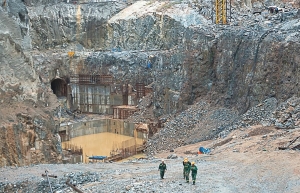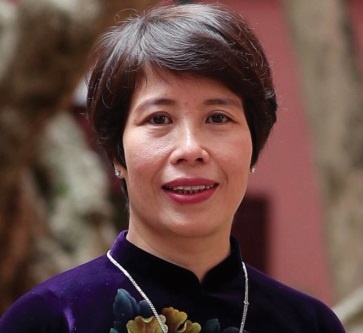Vietnam up to the challenge in hitting net-zero targets
Nicole Glahnemann, deputy director general of the Department of Energy and Climate Cooperation in Asia at the German Ministry of Economic Affairs and Climate Action, last week travelled to Hanoi to attend a policy dialogue on renewable energy and activities to promote cooperation on green energy. Energy has been one of the development priorities of the German government in Vietnam since 2013 as it contributes to the nation’s reduction of greenhouse gases (GHG).
Germany’s strategy has five main strategic pillars to realise this goal: promoting renewable energy, phasing out coal, increasing energy efficiency, developing clean hydrogen, and the electrification of transport, heat, and industry. Continual policy developments have contributed to accelerating the deployment of renewable energy in Germany, with renewables accounting for nearly half of the nation’s current electricity production.
 |
| People, companies, and organisations will all have to transition to cleaner energy habits, Photo: Shutterstock |
Vietnam and Germany are aiming for net-zero emissions by 2045 and 2050, respectively, and the German government hopes to have “more bilateral cooperation activities” with Vietnam, said Glahnemann.
About 135 countries have committed to achieving net-zero emissions by mid-century. In Vietnam, the trend of energy transition is associated with the rapid growth of the economy, urbanisation, and industrialisation. Relying on coal and oil energy has created a large amount of energy, but GHG emissions are one of the main causes of climate change. According to estimates by the World Bank, Vietnam lost $10 billion in 2020, equivalent to 3.2 per cent of its GDP, due to the effects of climate change.
In 2021, Vietnam ranked 61st out of 115 countries in terms of readiness for energy transition in the World Economic Forum’s Energy Transition Index. Vietnam was one of the first countries to submit an update of its Nationally Determined Contribution to the UN Framework Convention on Climate Change in 2020, committing to reduce GHG emissions. Such sectors as electricity and transportation have tended to change the most in response to Vietnam’s commitment to reducing these emissions.
Currently, Vietnam’s electricity production mainly depends on hydropower, natural gas, and coal. However, there is currently little room for hydropower development. Gas power developed strongly between 1999 and 2014, with a peak in 2010. However, starting with the Power Development Plan VI from 2007, coal power has become the mainstay. Since 2015, coal production has surpassed gas production, and has increased by an average of 13 per cent a year.
Despite the increasing impacts of climate change in Vietnam, the level of climate optimism remains at 61.7 per cent, according to the Climate Reality Barometer survey conducted by Japanese group Epson.
“Immediate financial issues are now a top concern,” the survey concluded. Vietnamese people said economic recovery was the priority, while climate change ranked second. Nevertheless, despite the global economic downturn, conflicts, and rising energy bills, the climate crisis is still a concern for many people around the world.
However, concerns about climate change do not lead to pessimism. Before COP26 in 2021, up to 46 per cent of respondents globally believed that the climate disaster was controllable. By the time the world prepared for this year’s summit in Egypt, this proportion had increased to more than 48 per cent. However, some experts argue, the optimism shows the lack of awareness about the impacts of climate change on the planet.
Many participants in the Climate Reality Barometer survey in Vietnam, however, said they have been more likely to use recyclable products, strengthen recycling habits, and reduce plastic waste.
While individuals are actively making changes, the barometer says it is not enough. “The Vietnamese government needs to regulate sustainability, businesses need to develop sustainable policies and technologies, and individuals must accelerate lifestyle changes even more,” it stated.
The survey aims to raise awareness and empower transformative change, commented Yasunori Ogawa, global president of Epson.
“We hope the insights provided by the survey will help governments, industry participants, and individuals step up efforts to avert the climate catastrophe,” Ogawa explained.
| Nguyen Thi Bich Ngoc-Deputy Minister of Planning and Investment | |
The energy transition is the responsibility of stakeholders from the central to local levels, social organisations, and communities to build an alternative route for polluting facilities and high carbon emission infrastructure. In addition to perfecting institutions and policies, the leaders of the Ministry of Planning and Investment called for raising awareness within the community, focusing on the economical use of energy. | |
| Dang Hoang An-Deputy Minister of Industry and Trade | |
To meet the requirements of economic development and the goal of becoming a high-income country by 2045, Vietnam has been building a strong energy transition programme. Fossil energy sources will be gradually switched to green, clean energy sources, reducing GHG emissions and combating climate change. Vietnam has set four goals for the energy transition: no new coal-fired power plants after 2030, an increase in renewable energy sources, early access to technologies using new primary energy sources such as green hydrogen and green ammonia, and an improvement of the transmission and distribution infrastructure of the national electricity system. | |
| Nguyen Quang Vinh-Chairman Business Council for Sustainable Development in Vietnam | |
At the same time, indicators of a circular economy, as well as economical and efficient use of energy, are reflected in the annual assessment of sustainable businesses in Vietnam. The sprint towards net-zero is both a responsibility and an opportunity for businesses, as pioneers will enjoy many advantages from timely changes in legal regulations. |
 | EU getting involved with net-zero push The European Union has committed to continue extending more assistance to Vietnam so that the country can develop its renewable energy and achieve its net-zero emissions as committed. |
What the stars mean:
★ Poor ★ ★ Promising ★★★ Good ★★★★ Very good ★★★★★ Exceptional
Related Contents
Latest News
More News
- Trung Nam-Sideros River consortium wins bid for LNG venture (January 30, 2026 | 11:16)
- Vietnam moves towards market-based fuel management with E10 rollout (January 30, 2026 | 11:10)
- Envision Energy, REE Group partner on 128MW wind projects (January 30, 2026 | 10:58)
- Vingroup consults on carbon credits for electric vehicle charging network (January 28, 2026 | 11:04)
- Bac Ai Pumped Storage Hydropower Plant to enter peak construction phase (January 27, 2026 | 08:00)
- ASEAN could scale up sustainable aviation fuel by 2050 (January 24, 2026 | 10:19)
- 64,000 hectares of sea allocated for offshore wind surveys (January 22, 2026 | 20:23)
- EVN secures financing for Quang Trach II LNG power plant (January 17, 2026 | 15:55)
- PC1 teams up with DENZAI on regional wind projects (January 16, 2026 | 21:18)
- Innovation and ESG practices drive green transition in the digital era (January 16, 2026 | 16:51)




 Tag:
Tag:




















 Mobile Version
Mobile Version